2023年中考英语复习 第2部分 第7章 动词与动词短语课件(102张PPT)
文档属性
| 名称 | 2023年中考英语复习 第2部分 第7章 动词与动词短语课件(102张PPT) |  | |
| 格式 | pptx | ||
| 文件大小 | 585.1KB | ||
| 资源类型 | 教案 | ||
| 版本资源 | 人教新目标(Go for it)版 | ||
| 科目 | 英语 | ||
| 更新时间 | 2023-06-10 10:20:31 | ||
图片预览

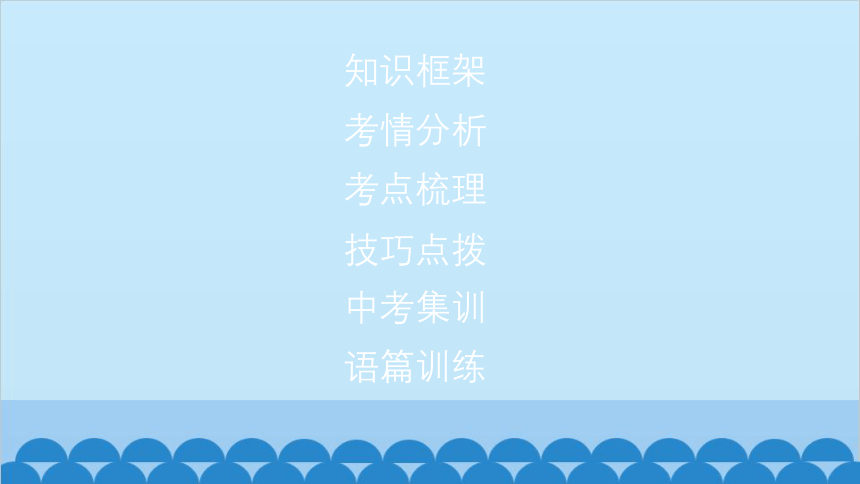
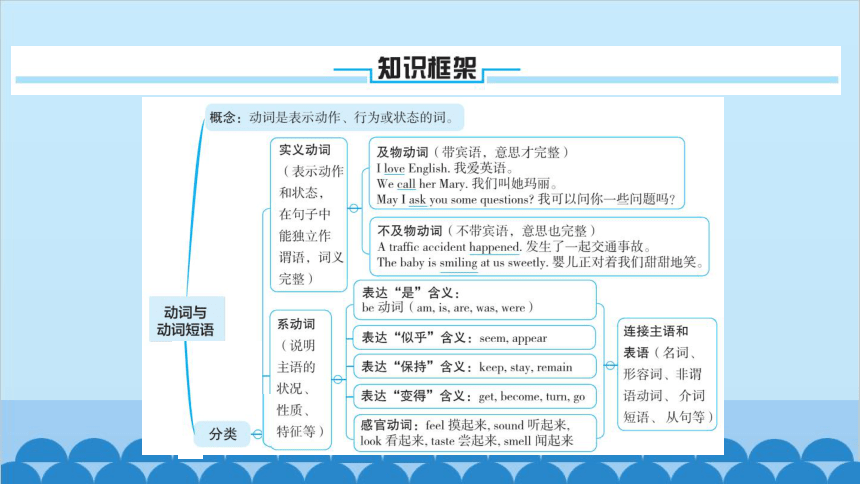
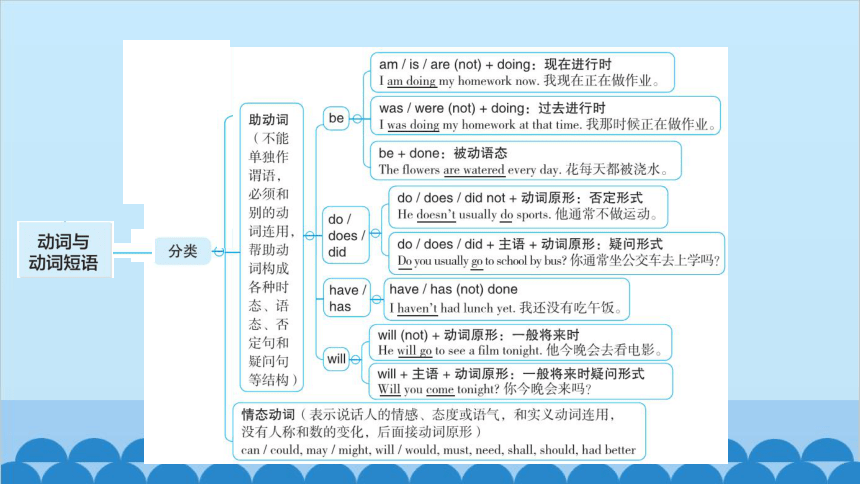


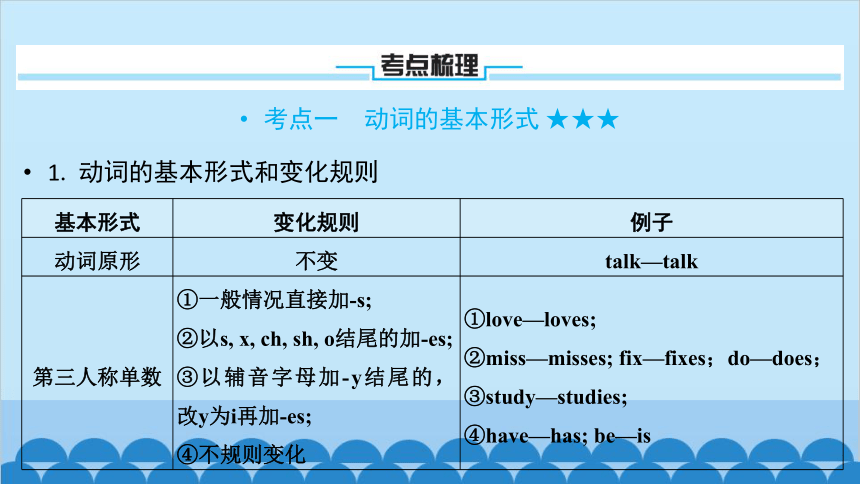
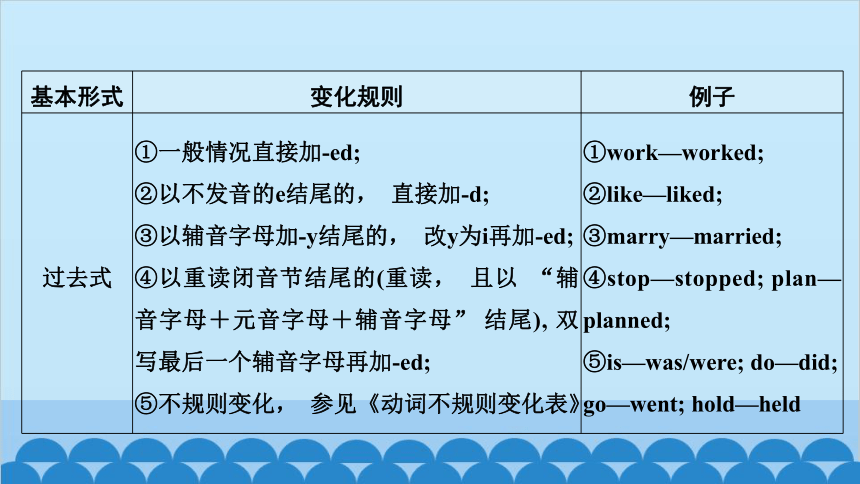


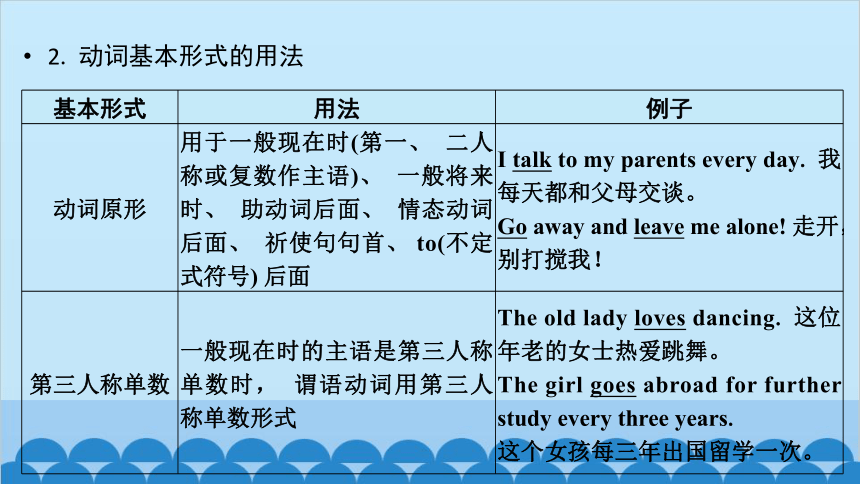
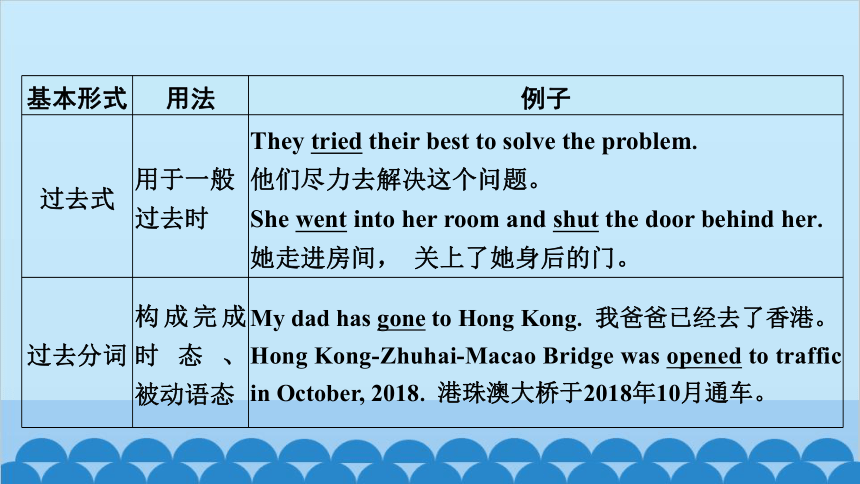
文档简介
(共102张PPT)
第二部分 语法精讲精练
第七章 动词与动词短语
知识框架
考情分析
考点梳理
技巧点拨
中考集训
语篇训练
考点 题型
语法选择 短文填空
动词的基本形式 / 2022 [第72题 become (过去分词构成现在完成时)]
2021 [第71题 written (过去分词构成现在完成时)]
实义动词 / /
系动词 / 2022 (第72题 become)
助动词 / /
情态动词 / /
考点 题型
语法选择 短文填空
动词短语 / 2021 (第68题 call sb. sth)
2021 (第69题 work as)
2020 (第72题 set up)
分析: 近三年广东中考中, 短文填空考查了动词的基本形式, 主要是针对 “have+过去分词” 构成现在完成时的考查。 另外, 动词短语的固定搭配也是短文填空的考查重点。 2022年还考查了系动词。
考点一 动词的基本形式 ★★★
1. 动词的基本形式和变化规则
基本形式 变化规则 例子
动词原形 不变 talk—talk
第三人称单数 ①一般情况直接加-s; ②以s, x, ch, sh, o结尾的加-es; ③以辅音字母加-y结尾的, 改y为i再加-es; ④不规则变化 ①love—loves;
②miss—misses; fix—fixes;do—does;
③study—studies;
④have—has; be—is
基本形式 变化规则 例子
过去式 ①一般情况直接加-ed; ②以不发音的e结尾的, 直接加-d; ③以辅音字母加-y结尾的, 改y为i再加-ed; ④以重读闭音节结尾的(重读, 且以 “辅音字母+元音字母+辅音字母” 结尾), 双写最后一个辅音字母再加-ed; ⑤不规则变化, 参见《动词不规则变化表》 ①work—worked;
②like—liked;
③marry—married;
④stop—stopped; plan—planned;
⑤is—was/were; do—did; go—went; hold—held
基本形式 变化规则 例子
过去分词 ①规则变化, 与动词的过去式变化规则相同; ②不规则变化, 参见《动词不规则变化表》 ①work—worked; like—liked;
marry—married; stop—stopped;
②do—done; forget—forgotten
基本形式 变化规则 例子
动名词 ①一般情况直接加-ing; ②以不发音的e结尾的, 去e加-ing; ③以重读闭音节结尾的, 双写最后一个辅音字母再加-ing; ④以ie结尾的, 改ie为y再加-ing ①keep—keeping;
②live—living;
③shop—shopping; begin—beginning;
④lie—lying; die—dying
现在分词
2. 动词基本形式的用法
基本形式 用法 例子
动词原形 用于一般现在时(第一、 二人称或复数作主语)、 一般将来时、 助动词后面、 情态动词后面、 祈使句句首、 to(不定式符号) 后面 I talk to my parents every day. 我每天都和父母交谈。
Go away and leave me alone! 走开, 别打搅我!
第三人称单数 一般现在时的主语是第三人称单数时, 谓语动词用第三人称单数形式 The old lady loves dancing. 这位年老的女士热爱跳舞。
The girl goes abroad for further study every three years.
这个女孩每三年出国留学一次。
基本形式 用法 例子
过去式 用于一般过去时 They tried their best to solve the problem.
他们尽力去解决这个问题。
She went into her room and shut the door behind her.
她走进房间, 关上了她身后的门。
过去分词 构成完成时态、 被动语态 My dad has gone to Hong Kong. 我爸爸已经去了香港。
Hong Kong-Zhuhai-Macao Bridge was opened to traffic in October, 2018. 港珠澳大桥于2018年10月通车。
基本形式 用法 例子
现在分词 构成现在进行时、 过去进行时 Listen! The bird is singing over there.
听!小鸟在那边唱歌。
I was shopping when you called me last night.
昨晚你打电话给我的时候, 我在购物。
动名词 起名词作用, 常用于固定搭配中 We should practice speaking English every day.
我们应该每天练习讲英语。
They enjoy eating mooncakes on Mid-Autumn Festival.
他们喜欢在中秋节吃月饼。
( )1. At this time yesterday, I____a science exam. 【2022 河北改编】
A. take B. was taking C. have taken
B
考点二 实义动词 ★★★
实义动词, 也称行为动词, 分为及物动词 (vt.) 和不及物动词 (vi.)。 及物动词要带宾语, 意思才完整, 而不及物动词不带宾语, 意思也完整。
分类 结构 例子
及物动词 及物动词+宾语: vt.+sb./sth. I love my parents. 我爱我的父母。
及物动词+宾语+宾补: vt.+sb./sth.+do/adj./n. (make, let, have, watch, notice, hear, see, call等)
The rainy day makes me sad.
雨天使我感到沮丧。
及物动词+间接宾语+直接宾语vt.+sb.+sth. (give, bring, buy, get, leave, lend, make, offer, pass, teach, tell, write, read, return等)
Benny teaches us spoken English this term.
本尼这个学期教我们英语口语。
分类 结构 例子
不及物动词 主语+不及物动词 The baby is smiling.
这个婴儿正在笑。
不及物动词+介词+宾语 The baby is smiling at us.
这个婴儿正对着我们笑。
不及物动词+状语 (时间、 地点、 程度、 方式等) My father arrived at 9:00 p.m.
我爸爸晚上九点到达。
注意:
(1)有些动词既是及物动词, 又是不及物动词。 如:
We study English. 我们学英语。 (该句中study是及物动词)
We study hard. 我们认真学习。 (该句中study是不及物动词)
(2)“vt.+sb.+sth.” 可转化成 “vt.+sth.+to+sb.”, 适用于该结构的动词有: give, sell, offer, teach, pass, show, lend, promise, tell。 如:
She gave the woman a ticket. =She gave a ticket to the woman.
她给了那个女人一张票。
(3) “vt.+sb.+sth.” 可转化成 “vt.+sth.+for+sb.”, 适用于该结构的动词有: buy, cook, choose, prepare, keep。 如:
My father bought me a new mobile phone. =My father bought a new mobile phone for me. 我爸爸给我买了一台新手机。
(4) “vt.+sb.+sth.” 可转化成 “vt.+sth.+to/for+sb.”, 适用于该结构的动词有: bring, sing, read, get。 如:
The little girl brought me a letter. =The little girl brought a letter to/for me. 那个小女孩带给我一封信。
( )2. Mrs. Stone asked the two girls together and talked with them. Mrs. Stone helped them____that it was a good idea to take turns to decide the activity.
A. describe B. explain C. realize
( )3. —I want to take part in after-class activities.
—So do I. I think these activities can make us____relaxed.
A. feel B. to feel C. feeling
C
A
( )4. Some days they could spend hours happily together without any argument, but other days they just could not____on what to do.
A. agree B. consider C. depend
A
考点三 系动词 ★★
1. 系动词, 也称连系动词, 初中阶段包括: 五感官、 三变化、 三保持、 一好像, 一个be。
五感官 look看起来, smell闻起来, sound听起来, taste尝起来, feel感觉起来; 摸起来
三变化 become变成; 变得, get变(好/坏/长/短/冷/热……), turn变(颜色)
三保持 keep保持, stay保持, remain保持
一好像 seem似乎; 好像
一个be be是, 根据时态和人称, 有is, am, are, was, were, been等变化
如: The cake tastes delicious. 这蛋糕尝起来很美味。
The leaves turn yellow in fall. 树叶在秋天变成黄色。
( )5. Mom is cooking chicken soup. It ____ so good. 【2021 青海改编】
A. sounds B. tastes C. smells
( )6. May I have some more chicken It ____ so delicious.
A. feels B. smells C. tastes
C
C
2. 系动词+形容词, 作表语。
如: The meat smells bad. You'd better throw it away. 这肉闻起来很臭。你最好把它扔掉。
If you want to keep healthy, you can eat more fruit. 如果你想保持健康, 你可以多吃水果。
( )7. His grandfather did his best to keep the tree ____, but it died in the end.
A. alive B. asleep C. absent
A
考点四 助动词 ★
助动词本身没有词义, 必须和实义动词连用。助动词可以调到句首, 构成一般疑问句。在助动词后加not, 构成否定句。
常见的助动词 用法
be(am, is, are, was, were) 进行时、 被动语态
do(does, did) 一般现在时、 一般过去时
have(has, had) 完成时
will(would) 将来时
should(shall) 表示委婉语气
如: He was training his guide dog at that time. 他那时在训练他的导盲犬。
Will people have robots in the future?将来人们会有机器人吗?
( )8. —What is your mother doing, Linda
—She ____ dinner in the kitchen now.
A. is cooking B. was cooking C. cook
A
考点五 情态动词 ★★
情态动词表示说话人的情感、 态度或语气。要跟实义动词连用才有意义, 没有人称和数的变化, 后面接动词原形, 否定式直接在后面加not。 情态动词调到句首, 构成一般疑问句。
1. 常用的情态动词
情态 动词 must can may could might should shall need had better
定义 必须;肯定 能;可能 可以;也许 can的过去式; can的委婉语气 may的过去式;may的委婉语气 应该 应该(用于第一人称I, we) 必须; 必要 (常用于否定式) 最好(缩写:'d better)
如: She must study hard so that she can go to a good university. 为了能够上一所好的大学, 她必须努力学习。
We can't always think about ourselves. We should think about others. 我们不能总是想着自己。我们应该为别人着想。
( )9. According to the new traffic rules, people ____ wear a helmet when riding an e-bike. 【2021 苏州改编】
A. can B. may C. must
C
2. 情态动词表示猜测、 推测
情态动词 must can, may, could, might can't be
定义 一定; 肯定 也许; 可能 不可能是; 肯定不是
注意: must be 意为 “一定是, 肯定是”, 表示推测; mustn't 表示 “禁止, 不准”, 不表示猜测。
如: You must be joking. 你一定是在开玩笑。
The lady can't be our teacher. She has gone to Shanghai. 这位女士肯定不是我们的老师。她已经去了上海。
( )10. —Whose English book is this
—It____be Lily's, but I'm not sure. 【2022 怀化】
A. might B. can't C. must
A
3. 情态动词表示请求、 命令、 许可等
情态动词 定义 否定式
can/may/could/might 可以 后面直接加not, 表示 “不可以”
must 必须 mustn't 禁止
need 需要 needn't 不必
should/shall 应该(shall只用于I/we) shouldn't/shall not 不应该
will/would 愿意; 想要 won't/wouldn't 不愿意; 不想要
have to 不得不(因外界因素) don't have to 没必要
had better do sth. 最好做某事 had better not do sth. 最好不做某事
如: You mustn't smoke here. 你不许在这里抽烟。
You'd better tell your father the truth. 你最好告诉你爸爸真相。
( )11. I know I ____ do much, but perhaps I can cheer him a little. 【2021 广州改编】
A. needn't B. shouldn't C. can't
C
4. 情态动词的用法辨析
(1)以must开头的疑问句, 意为 “……必须……吗”, 否定回答不能用No, you mustn't. (表示禁止)。
肯定回答 Yes, you must. 是的。
否定回答 No, you needn't/don't have to. 不, 你没必要。
如: —Must I finish the work now 我必须现在完成这项工作吗?
—Yes, you must. 是的, 你必须。
—No, you needn't/don't have to. 不, 你没必要。(不能用you mustn't)
(2)May I/Could I/Can I…?表示请求, 意为 “我可以……吗?”, 否定回答不能用No, you couldn't/you may not.(回答不够明确)。
肯定回答 Yes, you can./Yes, please./Of course./Certainly./Sure./OK./Go ahead. 是的, 你可以。/是的, 请。/当然。/可以。/做吧。
否定回答 No, you can't./No, you mustn't./Sorry, you'd better not./I'm afraid you can't. 不, 你不能。/不, 你不准。/抱歉, 你最好不要。/恐怕不行。
如: —May I borrow your book 我可以借你的书吗?
—Yes, you can. Here you are. 可以, 给你。
—Sorry, I have to read it now. 抱歉, 我现在得看这本书。
(3)Can you/Could you…?表示邀请、 询问, 意为 “你可以……吗?”。
肯定回答 Yes, I can./Yes, I'd love to./Of course./ Certainly./Sure./OK. 好的, 我可以。/好的, 我乐意。/当然。/可以。
否定回答 Sorry, I can't. I have to…/Sorry, I'm afraid not. 抱歉, 我不能, 我得……/对不起, 恐怕不行。
如: —Could you please come to my party tonight 今晚你能来参加我的晚会吗?
—Yes, I'd like to. 好的, 我乐意(参加)。
—Sorry, I can't. I have to finish my homework. 对不起, 我去不了, 我得完成作业。
(4)can, be able to表示可以、 能够。
情态动词 人称变化 时态
can 不变 只有过去时could
be able to 随主语变化 适用所有时态, 通过be动词的变化体现时态
如: He will be able to learn English by himself. 他将能够自学英语。
I could swim at the age of 8. 我在8岁的时候就会游泳了。
(5)must, have to表示必须。
情态动词 定义 用法
must 必须; 一定要 表示说话人的主观看法
have to 必须; 不得不 表示客观需要, 受外界影响
如: I must study hard from now on. 我从现在开始必须努力学习。
I have to go now because of the bad weather. 由于坏天气, 我现在必须走了。
(6)may be, maybe表示也许、 可能。
情态动词 构成/属性 位置 区别
may be 情态动词+be动词原形 置句中 去除后句子缺少谓语动词
maybe 副词 置句首、 句末 去除后句子依然完整
如: He may be good at physics. 他可能擅长物理。
Maybe he is good at physics. 他可能擅长物理。
(7)need表示必须、 必要, 既可作情态动词, 又可作实义动词。
词性 否定 用法
情态动词 needn't=don't have to没必要 极少用于肯定式
实义动词 don't need不需要 sb. need(s) to do sth. 某人需要做某事;
sth. need(s) doing某物需要被……
如: You needn't lend your book to your deskmate. 你没必要借书给你的同桌。
I don't need to get up too early at weekends. 周末我不必太早起床。
The flowers need watering. 花要浇水了。
( )12. —Sam, ____ I join you in the community service
—Of course you can. 【2021 北京改编】
A. can B. must C. should
( )13. According to the traffic law, children under 12 ____ ride bicycles on the road.
A. needn't B. wouldn't C. mustn't
A
C
考点六 动词短语 ★★★
1. 由两个或两个以上的词一起构成一个短语, 相当于一个动词, 称为动词短语。
分类 例子 代词位置 名词位置
动词+副词 turn on打开 give out分发 give up放弃 放中间: turn it on give them out give it up 中间、 后面均可:
turn on the radio=turn the radio on
动词+介词 look for寻找 放后面: look for him catch up with us pay attention to her 放后面:
look for my book
动词+副词+介词 catch up with赶上
动词+名词+介词 pay attention to注意
( )14. My father always tells me never to ____ when I am in trouble. 【2021 益阳】
A. give up B. put on C. help out
A
2. 常考的动词短语
(1)与make有关的短语
be made of由……制成(看得出原材料) be made in在某地制造
be made from由……制成(看不出原材料) be made by由……制造; 通过……制作
如: The bridge is made of stones. 这座桥是由石头建成的。
The wine is made from grapes and is made in France. 这葡萄酒是由葡萄酿制而成, 产于法国。
(2)与come有关的短语
come across (偶然)遇见或发现 come back回来 come down落; 下来
come out出版; 出来; 开花; 发芽 come from来自 come true实现
come to到达; 共计 come in进来 come over顺便来访
come up with想出(主意) come on来吧; 加油; 赶快; 得了吧
如: His dream has come true at last. 他的梦想终于实现了。
Mo Yan's new novel came out last month. 莫言的新小说上个月出版了。
(3)与fall 有关的短语
fall asleep入睡 fall behind落后 fall off=fall down from 从……落下
fall down跌落 fall in love with 爱上 fall over 绊倒
如: The young man fell down from his bike by accident. 这个年轻人意外地从自行车上摔了下来。
They all fell asleep quickly after working for a long time. 长时间工作后, 他们很快都入睡了。
(4)与get有关的短语
get away逃离 get back回来; 取回 get close to接近
get down降下 get together聚会; 联欢 get on上车
get out of从……出来 get ready for为……做准备 get off下车
get up起床 get on well with/get along well with与……相处得好
如: The students in my class get on well with each other. 我班的学生们 彼此相处得很好。
You can't get off the bus until it stops. 公交车没停下来之前, 你不能下车。
(5)与give有关的短语
give away赠送 give back归还 give out分发
give up放弃 give a hand to sb. 帮助某人
如: My brother gave up smoking last year. 我哥哥去年戒烟了。
We give away old books and money to the poor children. 我们向贫困孩子捐赠旧书和钱。
(6)与go有关的短语
go away走开 go over仔细检查; 复习 go for a walk去散步
go out出去; 熄灭 go through浏览; 通过; 经受 go for a picnic去野餐
go ahead去吧; 进行 go on doing sth./go on with sth. 继续做某事 go in for参加; 喜欢
go by经过; 走过 go fishing/shopping/skating去钓鱼/购物/滑冰
如: You must go over what you have learned. 你必须复习学过的知识。
I won the game just now. Let's go on playing the game. 我刚才赢了游戏。我们继续玩游戏吧。
(7)与keep有关的短语
keep off避开; 勿踩踏 keep on继续进行 keep up保持; 维持
keep doing sth. 继续做某事 keep in touch with与……保持联系 keep one's word守信
如: Please keep off the grass. 请勿践踏草坪。
We can keep in touch with each other through WeChat. 我们可以通过微信相互保持联系。
(8)与look有关的短语
look over检查 look into向里面看; 调查 look around向四周看
look after照顾 look down upon看不起; 轻视 look out留神; 当心
look for寻找 look up查阅; 查找 look through浏览; 看穿
look forward to (doing) sth. 盼望(做)某事
如: The doctor looked over the baby carefully. 医生很仔细地为这个宝宝检查。
If you don't know the word, you can look it up in the dictionary. 你若不懂这个单词, 可查一下字典。
(9)与put有关的短语
put away 收起来; 放好 put down 放下; 记下 put off 推迟
put on 穿上; 上演; 增加(体重) put out扑灭; 熄灭 put up 挂起; 举起; 张贴
如: The little girl put away her skirts just now. 这个小女孩刚才把自己的裙子收好了。
Never put off till tomorrow what you can do today. 今日事, 今日毕。
(10)与take有关的短语
take away拿走 take off脱下; 起飞 take place发生
take out取出 take care of照顾 take the place of取代; 代替
take turns轮流 take part in参加 take it easy别着急; 别紧张
take in吸入 take pride in对……感到自豪 take sb. in the arms搂抱某人
take after 长得像 take one's time从容; 慢慢行动
如: The plane is taking off. 飞机正在起飞。
The old should be taken good care of. 老年人应该被好好照顾。
(11)与turn有关的短语
turn down调小; 拒绝 turn off关掉(水、 电器、 煤气) turn to翻到
turn up调大 turn on打开(水、 电器、 煤气) turn over翻转
如: He can't wait to turn on the computer every night. 每晚他都迫不及待地打开电脑。
The TV is too loud. Could you please turn it down?电视太大声, 请你调小声点好吗?
( )15. Doing chores helps to improve children's independence and teaches them how to____themselves. 【2022 昆明改编】
A. look for B. look after C. look through
( )16. Many Chinese people usually____some paper cuttings on windows, doors and walls as symbols of wishes for good luck. 【2022 遂宁改编】
A. put up B. cut up C. make up
B
A
3. 常考的动词、 动词短语辨析
(1)与used有关的短语
短语 含义
be/get used to doing sth. 习惯做某事
used to do sth. 过去常常做某事
be used to do sth. 被用来做某事
be used for doing sth. 被用于做某事
如: I used to get up late, but now I'm used to getting up early. 我过去常晚起, 但现在习惯早起。
Umbrellas are used to prevent the rain. 雨伞用来挡雨。
(2)到达
用法 例子 注意
get to+地点 get to school get home ①home, there, here在此作副词, 故前不用介词
②arrive是不及物动词, 后面可不接地点, 如: I arrived.
reach+地点 reach school reach home
arrive in+大地方; arrive at+小地方 arrive in Hong Kong arrive at school arrive home arrive there
如: When will you arrive 你将什么时候到达?
They arrived at the village without rest. 他们没有停歇, 到达了小村庄。
(3)借用、 归还
词汇/短语 含义及用法
borrow… from… 从……借来……(借入, 短暂性动词)
lend sth. to sb.=lend sb. sth. 把……借给……(借出, 短暂性动词)
return=give… back 归还(短暂性动词)
keep 保存; 借(延续性动词)
如: I borrowed a book from the school library and I can keep it for a month. 我从学校图书馆借来了一本书, 我可以保存一个月。
Could you lend your bike to me(=lend me your bike) 你可以把自行车借给我吗?
(4)看
词汇 含义及用法 搭配
look 看; 表动作 look at sb./sth. 朝某人/某物看
see 看见; 表结果 see sb. do/doing sth. 看见某人做/正在做某事
watch 观看; 注视 watch TV/a match/a movie看电视/比赛/电影
read 看(书报); 阅读 read a newspaper看报纸
如: Look at the blackboard, please. Can you see it clearly 请看黑板。你能看清吗?
I'd like to watch a movie tonight. 我想今晚去看电影。
Don't read books in the sun. It's bad for your eyes. 别在太阳下看书, 对眼睛有害。
(5)说话、 谈话
词汇 含义 用法
say 说 接内容(用 “” 引用, 或用it, what, that从句, 代替说的内容)
speak 说; 演讲 接语言; 在会议上发言; sb. speaking电话用语, 某人正在接电话
talk 交谈; 谈论 talk to sb./talk with sb. 与某人谈话; talk about sth. 谈论某事物
tell 告诉; 讲述 tell a story讲故事; tell a lie说谎; tell the truth说真相; tell sb. sth.
告诉某人某事; tell sb. (not) to do sth. 告诉某人(不)做某事
如: I can't understand what you said just now. 我不能理解你刚才所说的话。
Most people in the world speak English. 世界上大多数的人讲英语。
He likes talking to/with me. 他喜欢跟我交谈。
She told me a secret yesterday. 她昨天告诉我一个秘密。
(6)花费
词汇 含义 主语 用法
spend 花时间或钱 人 sb. spend… on sth./sb. spend… (in) doing sth. 某人在某方面花费……
sb. spend time with sb. 某人花时间和某人在一起
cost 花钱 物 sth. cost sb. some money某物花费某人金钱
pay 支付钱; 赔偿 人 sb. pay some money for sth. 某人为某物支付金钱
take 花时间 It或 Doing sth. It takes sb. some time+to do sth.=Doing sth. takes sb. some time某人花费时间做某事
如: I spent 30 yuan on the book.=I spent 30 yuan buying the book.
=The book cost me 30 yuan.=I paid 30 yuan for the book.
我花了30元买这本书。
It took me an hour to repair the bike.=I spent an hour (in) repairing the bike.
我花了一个小时修理这辆自行车。
(7)拿来、 带走
bring拿来; 带来 fetch去拿来(一去一回)
take拿去; 带走 carry扛; 搬; 抱; 常用于重物
如: Sorry, I forgot to bring my bag here. 抱歉, 我忘记把包带来这里了。
Kate, take the umbrella with you. It's going to rain. 凯特, 把伞随身带去, 快下雨了。
The box is too heavy to carry. 这箱子太重了, 抬不起。
(8)穿着
词汇/短语 含义及用法 搭配
wear 穿着; 戴着, 表状态(延续性动词) 后接衣服、 饰品
put on 穿上, 表动作(非延续性动词) 宾语或代词可以放中间put on sth.=put sth. on
dress 穿衣服, 表示帮某人穿衣, 可以 表示状态, 也可以表示动作 dress sb. 给某人穿衣; dress oneself 自己穿衣服;dress up as… 装扮成……
in 表示穿着某颜色的衣服 后接颜色
如: Look at the man in green! He is wearing a thick coat on such a hot day! When did he put it on?看那个穿着绿衣服的男士! 他大热天穿着一件厚厚的大衣! 他什么时候穿上的?
Children dress up as ghosts on Halloween. 孩子们在万圣夜装扮成鬼的样子。
(9)听
词汇 含义及用法 搭配
listen 听(表动作过程) Listen!听!
listen to sth./sb. 听……
hear 听到(表结果) hear sb. do/doing sth. 听到某人做/正在做某事;
hear about/of sth. 听说某事;
hear from sb. 收到某人的来信
sound 听起来(接形容词) It sounds great!听起来很棒!
如: Listen! There is a girl singing outside. Can you hear It sounds fantastic! 听! 有个女孩在外面唱歌。你能听见吗? 听起来太美妙了!
(10)查找、 查明
词汇/短语 含义及用法
look for 寻找, 强调过程
find 找到, 强调结果
find out 查明, 强调经过调查等手段得到结果
如: I looked for my key everywhere, but I couldn't find it. 我到处找钥匙, 但我找不到。
The window is broken. Can you find out who broke it?窗户破了。你能查出是谁打破的吗?
(11)丢失、 忘记
词汇 含义 搭配
leave 落下; 留下; 离开 leave sth. somewhere把某物落在某地;
leave sb. alone 留某人独处
leave somewhere离开某地; leave for somewhere去某地
forget 忘记 forget to do sth. 忘记要做某事; forget doing sth. 忘记做过某事
lose 丢失 lose one's way迷路; lose oneself in 沉迷
如: I forgot to take my bag home. Maybe I left it in the reading room. 我忘记把包带回家了。可能我把它落在阅览室了。
I lost my watch and I wanted to buy a new one. 我的手表丢失了, 我想买个新的。
(12)参加
词汇 含义及用法 搭配
join 参加(某组织并成为其中一员) join the Party/the army/the club/us
入党/参军/加入俱乐部/加入我们
take part in=join in 参加(临时性活动) take part in/join in the party/
activities参加聚会/活动
attend 参加(正式活动) attend the meeting参加会议
如: Come and join us!快来加入我们吧!
We'll take part in social practice during the summer vacation. 我们将在暑期参加社会实践。
(13)输赢
词汇 含义 搭配
lose 输给; 丢掉 lose to sb. 输给某人; lose heart失去信心;
lose the game输掉比赛
fail 失败; 不及格 fail to do sth. 做某事失败了; fail the exam考试不及格
beat 打败(人、 队伍) beat sb. 打败某人; beat a strong team打败强队
win 赢得(荣誉、 地位、比赛、 战争等) win first prize/the game/the speaking contest/the war/one's heart赢得一等奖/比赛/演讲比赛/战争/某人的心
如: We lost the match.=We didn't win the match. 我们比赛输了。
Team A beat TeamB. A组打败了B组。
(14)变化
词汇 含义及用法 搭配
turn 变成, 用于颜色变化 turn red变红
get 渐渐变得, 用于事物或天气变化 get colder变得更冷
become 变得; 变成; 成为, 用于身份或趋势变化 become a teacher成为老师
如: The leaves turned brown. 叶子变成了褐色。
The sky got/grew dark soon. 天很快变黑了。
The days are getting longer and longer now. 现在白天变得越来越长了。
( )17. —Can I ____ Robinson Crusoe, Mrs. Zhao
—Sure, it's very interesting, but you can only ____ it for two weeks.
A. borrow; lend B. lend; borrow C. borrow; keep
C
( )18. —My father ____ to his workplace by bus, but now he ____ there by bike.
—Really You have an environmentally-friendly father.
A. used to go; is used to go
B. used to going; is used to go
C. used to go; is used to going
C
动词 (短语) 与短文填空
(1) 首先分析句子结构, 确定空格处的词性。
(2) 根据上下文语境, 确定空格处的词义。
(3) 观察空格前的内容, 选择恰当的动词形式。
Tea wasn't introduced into Europe until the early 17th century. And now it has 72 popular in Europe and America. 【2022 广东】
解析: 分析句子结构可知, 此处应为 “主语 (it) +系动词+表语 (popular)” 结构, 故空格处应填系动词。 根据上下文语境可推断, 此处表示 “现在它 (茶叶) 在欧洲和美国变得受欢迎”, 应用become。 由于空格前有has, 故用become的过去分词形式, 构成现在完成时, 故填become。
become
People there like to 73 tea with sugar or milk in it. 【2022 广东】
解析: 分析句子结构可知, 此处应为 “主语 (People)+谓语 (like)+宾语 (不定式 to do)” 结构, 故空格处应填动词。 根据上下文语境可推断, 此处表示 “那里的人们喜欢喝加糖或奶的茶”, 并且空格前为to, 故用动词原形, 构成不定式, 故填drink。
drink
( )1. On the table she lays out some vegetables in season, such as carrots and tomatoes. They are all from her garden and free for her neighbors to ____. 【2022 广东改编】
A. look at B. take away C. give up
( )2. —All of us ____ follow the traffic rules when going out.
—Exactly! Safety comes first. 【2022 宿迁改编】
A. might B. must C. could
B
B
( )3. —How was your camping in the countryside last weekend
—It was great. We____ a tent by the lake and had much fun. 【2022 云南改编】
A. put up B. put off C. put on
A
( )4. —Dad, what's for dinner It ____ nice!
—I'm cooking chicken soup. 【2022 无锡改编】
A. tastes B. smells C. looks
( )5. The Monkey King is not a normal monkey, he can ____ himself ____ different animals and objects. 【2022 岳阳】
A. turn; off B. turn; up C. turn; into
A
C
一、 语法选择
When throwing away rubbish, do you know which bin it should go into Shanghai announced in July that people 1 put the rubbish into four groups: recyclable, harmful, wet and dry.
( )1. A. must B. might C. can
A
Paper, metal, glass and other things which can 2 reused are recyclable waste. Harmful waste 3 things like medicine, batteries(电池)and bulbs(灯泡). They are not recyclable. Wet waste is also 4 as household waste. They are things that you 5 want but that pigs can eat. Some waste such as plastic bags, glass bottles and other man-made things will go into the “dry waste” bin.
( )2. A. is B. be C. are
( )3. A. include B. included C. includes
( )4. A. know B. known C. knowing
( )5. A. won't B. aren't C. don't
B
C
B
C
It 6 very important to know how to deal with your waste. If you don't deal with your waste, all of it will go to a landfill(垃圾场) and be buried(埋) together. These landfills can 7 large areas of the ground. The electronic waste you throw away 8 pollute the ground and water. Other pieces of rubbish can 9 make other things if they are properly recycled.
( )6. A. be B. are C. is
( )7. A. take up B. take off C. take away
( )8. A. can B. need C. should
( )9. A. be used for B. be used to C. used to
C
A
A
B
Many other Chinese cities, including Shenzhen, Guangdong plan to use this way to deal with their rubbish. It won't 10 too long. Let's encourage each other to deal with our waste well by putting them in groups to protect the environment.
( )10. A. spend B. take C. cost
B
二、 短文填空
Many years ago, a man was reading his morning newspaper. To his 1 , he saw his own name in the obituary column (讣告栏). The newspaper 2 a mistake and reported the death of the wrong person!
The man was upset to read about his “death”. After he cooled down, he read the rest of the obituary to 3 out what people said about him.
surprise
made
find
There 4 sentences like “Dynamite (炸药) King Died” and “He was the trader of death”. He was 5 for inventing dynamite. When he read the words “trader of death”, he 6
himself a question: “Is this how I am going to be remembered?”. He thought that he 7 make some kind of change in his life.
From that day on, he started to 8 for world peace. His name was Alfred Nobel and he is remembered today for setting 9 the Nobel Prize.
were
known/famous
asked
should
work
up
The Nobel Prize has honored men and women from all over the world for their work in physics, chemistry, medicine, world peace and so on 10 1901. After Nobel died, he left most of his money behind to support the Nobel Prize.
since
第二部分 语法精讲精练
第七章 动词与动词短语
知识框架
考情分析
考点梳理
技巧点拨
中考集训
语篇训练
考点 题型
语法选择 短文填空
动词的基本形式 / 2022 [第72题 become (过去分词构成现在完成时)]
2021 [第71题 written (过去分词构成现在完成时)]
实义动词 / /
系动词 / 2022 (第72题 become)
助动词 / /
情态动词 / /
考点 题型
语法选择 短文填空
动词短语 / 2021 (第68题 call sb. sth)
2021 (第69题 work as)
2020 (第72题 set up)
分析: 近三年广东中考中, 短文填空考查了动词的基本形式, 主要是针对 “have+过去分词” 构成现在完成时的考查。 另外, 动词短语的固定搭配也是短文填空的考查重点。 2022年还考查了系动词。
考点一 动词的基本形式 ★★★
1. 动词的基本形式和变化规则
基本形式 变化规则 例子
动词原形 不变 talk—talk
第三人称单数 ①一般情况直接加-s; ②以s, x, ch, sh, o结尾的加-es; ③以辅音字母加-y结尾的, 改y为i再加-es; ④不规则变化 ①love—loves;
②miss—misses; fix—fixes;do—does;
③study—studies;
④have—has; be—is
基本形式 变化规则 例子
过去式 ①一般情况直接加-ed; ②以不发音的e结尾的, 直接加-d; ③以辅音字母加-y结尾的, 改y为i再加-ed; ④以重读闭音节结尾的(重读, 且以 “辅音字母+元音字母+辅音字母” 结尾), 双写最后一个辅音字母再加-ed; ⑤不规则变化, 参见《动词不规则变化表》 ①work—worked;
②like—liked;
③marry—married;
④stop—stopped; plan—planned;
⑤is—was/were; do—did; go—went; hold—held
基本形式 变化规则 例子
过去分词 ①规则变化, 与动词的过去式变化规则相同; ②不规则变化, 参见《动词不规则变化表》 ①work—worked; like—liked;
marry—married; stop—stopped;
②do—done; forget—forgotten
基本形式 变化规则 例子
动名词 ①一般情况直接加-ing; ②以不发音的e结尾的, 去e加-ing; ③以重读闭音节结尾的, 双写最后一个辅音字母再加-ing; ④以ie结尾的, 改ie为y再加-ing ①keep—keeping;
②live—living;
③shop—shopping; begin—beginning;
④lie—lying; die—dying
现在分词
2. 动词基本形式的用法
基本形式 用法 例子
动词原形 用于一般现在时(第一、 二人称或复数作主语)、 一般将来时、 助动词后面、 情态动词后面、 祈使句句首、 to(不定式符号) 后面 I talk to my parents every day. 我每天都和父母交谈。
Go away and leave me alone! 走开, 别打搅我!
第三人称单数 一般现在时的主语是第三人称单数时, 谓语动词用第三人称单数形式 The old lady loves dancing. 这位年老的女士热爱跳舞。
The girl goes abroad for further study every three years.
这个女孩每三年出国留学一次。
基本形式 用法 例子
过去式 用于一般过去时 They tried their best to solve the problem.
他们尽力去解决这个问题。
She went into her room and shut the door behind her.
她走进房间, 关上了她身后的门。
过去分词 构成完成时态、 被动语态 My dad has gone to Hong Kong. 我爸爸已经去了香港。
Hong Kong-Zhuhai-Macao Bridge was opened to traffic in October, 2018. 港珠澳大桥于2018年10月通车。
基本形式 用法 例子
现在分词 构成现在进行时、 过去进行时 Listen! The bird is singing over there.
听!小鸟在那边唱歌。
I was shopping when you called me last night.
昨晚你打电话给我的时候, 我在购物。
动名词 起名词作用, 常用于固定搭配中 We should practice speaking English every day.
我们应该每天练习讲英语。
They enjoy eating mooncakes on Mid-Autumn Festival.
他们喜欢在中秋节吃月饼。
( )1. At this time yesterday, I____a science exam. 【2022 河北改编】
A. take B. was taking C. have taken
B
考点二 实义动词 ★★★
实义动词, 也称行为动词, 分为及物动词 (vt.) 和不及物动词 (vi.)。 及物动词要带宾语, 意思才完整, 而不及物动词不带宾语, 意思也完整。
分类 结构 例子
及物动词 及物动词+宾语: vt.+sb./sth. I love my parents. 我爱我的父母。
及物动词+宾语+宾补: vt.+sb./sth.+do/adj./n. (make, let, have, watch, notice, hear, see, call等)
The rainy day makes me sad.
雨天使我感到沮丧。
及物动词+间接宾语+直接宾语vt.+sb.+sth. (give, bring, buy, get, leave, lend, make, offer, pass, teach, tell, write, read, return等)
Benny teaches us spoken English this term.
本尼这个学期教我们英语口语。
分类 结构 例子
不及物动词 主语+不及物动词 The baby is smiling.
这个婴儿正在笑。
不及物动词+介词+宾语 The baby is smiling at us.
这个婴儿正对着我们笑。
不及物动词+状语 (时间、 地点、 程度、 方式等) My father arrived at 9:00 p.m.
我爸爸晚上九点到达。
注意:
(1)有些动词既是及物动词, 又是不及物动词。 如:
We study English. 我们学英语。 (该句中study是及物动词)
We study hard. 我们认真学习。 (该句中study是不及物动词)
(2)“vt.+sb.+sth.” 可转化成 “vt.+sth.+to+sb.”, 适用于该结构的动词有: give, sell, offer, teach, pass, show, lend, promise, tell。 如:
She gave the woman a ticket. =She gave a ticket to the woman.
她给了那个女人一张票。
(3) “vt.+sb.+sth.” 可转化成 “vt.+sth.+for+sb.”, 适用于该结构的动词有: buy, cook, choose, prepare, keep。 如:
My father bought me a new mobile phone. =My father bought a new mobile phone for me. 我爸爸给我买了一台新手机。
(4) “vt.+sb.+sth.” 可转化成 “vt.+sth.+to/for+sb.”, 适用于该结构的动词有: bring, sing, read, get。 如:
The little girl brought me a letter. =The little girl brought a letter to/for me. 那个小女孩带给我一封信。
( )2. Mrs. Stone asked the two girls together and talked with them. Mrs. Stone helped them____that it was a good idea to take turns to decide the activity.
A. describe B. explain C. realize
( )3. —I want to take part in after-class activities.
—So do I. I think these activities can make us____relaxed.
A. feel B. to feel C. feeling
C
A
( )4. Some days they could spend hours happily together without any argument, but other days they just could not____on what to do.
A. agree B. consider C. depend
A
考点三 系动词 ★★
1. 系动词, 也称连系动词, 初中阶段包括: 五感官、 三变化、 三保持、 一好像, 一个be。
五感官 look看起来, smell闻起来, sound听起来, taste尝起来, feel感觉起来; 摸起来
三变化 become变成; 变得, get变(好/坏/长/短/冷/热……), turn变(颜色)
三保持 keep保持, stay保持, remain保持
一好像 seem似乎; 好像
一个be be是, 根据时态和人称, 有is, am, are, was, were, been等变化
如: The cake tastes delicious. 这蛋糕尝起来很美味。
The leaves turn yellow in fall. 树叶在秋天变成黄色。
( )5. Mom is cooking chicken soup. It ____ so good. 【2021 青海改编】
A. sounds B. tastes C. smells
( )6. May I have some more chicken It ____ so delicious.
A. feels B. smells C. tastes
C
C
2. 系动词+形容词, 作表语。
如: The meat smells bad. You'd better throw it away. 这肉闻起来很臭。你最好把它扔掉。
If you want to keep healthy, you can eat more fruit. 如果你想保持健康, 你可以多吃水果。
( )7. His grandfather did his best to keep the tree ____, but it died in the end.
A. alive B. asleep C. absent
A
考点四 助动词 ★
助动词本身没有词义, 必须和实义动词连用。助动词可以调到句首, 构成一般疑问句。在助动词后加not, 构成否定句。
常见的助动词 用法
be(am, is, are, was, were) 进行时、 被动语态
do(does, did) 一般现在时、 一般过去时
have(has, had) 完成时
will(would) 将来时
should(shall) 表示委婉语气
如: He was training his guide dog at that time. 他那时在训练他的导盲犬。
Will people have robots in the future?将来人们会有机器人吗?
( )8. —What is your mother doing, Linda
—She ____ dinner in the kitchen now.
A. is cooking B. was cooking C. cook
A
考点五 情态动词 ★★
情态动词表示说话人的情感、 态度或语气。要跟实义动词连用才有意义, 没有人称和数的变化, 后面接动词原形, 否定式直接在后面加not。 情态动词调到句首, 构成一般疑问句。
1. 常用的情态动词
情态 动词 must can may could might should shall need had better
定义 必须;肯定 能;可能 可以;也许 can的过去式; can的委婉语气 may的过去式;may的委婉语气 应该 应该(用于第一人称I, we) 必须; 必要 (常用于否定式) 最好(缩写:'d better)
如: She must study hard so that she can go to a good university. 为了能够上一所好的大学, 她必须努力学习。
We can't always think about ourselves. We should think about others. 我们不能总是想着自己。我们应该为别人着想。
( )9. According to the new traffic rules, people ____ wear a helmet when riding an e-bike. 【2021 苏州改编】
A. can B. may C. must
C
2. 情态动词表示猜测、 推测
情态动词 must can, may, could, might can't be
定义 一定; 肯定 也许; 可能 不可能是; 肯定不是
注意: must be 意为 “一定是, 肯定是”, 表示推测; mustn't 表示 “禁止, 不准”, 不表示猜测。
如: You must be joking. 你一定是在开玩笑。
The lady can't be our teacher. She has gone to Shanghai. 这位女士肯定不是我们的老师。她已经去了上海。
( )10. —Whose English book is this
—It____be Lily's, but I'm not sure. 【2022 怀化】
A. might B. can't C. must
A
3. 情态动词表示请求、 命令、 许可等
情态动词 定义 否定式
can/may/could/might 可以 后面直接加not, 表示 “不可以”
must 必须 mustn't 禁止
need 需要 needn't 不必
should/shall 应该(shall只用于I/we) shouldn't/shall not 不应该
will/would 愿意; 想要 won't/wouldn't 不愿意; 不想要
have to 不得不(因外界因素) don't have to 没必要
had better do sth. 最好做某事 had better not do sth. 最好不做某事
如: You mustn't smoke here. 你不许在这里抽烟。
You'd better tell your father the truth. 你最好告诉你爸爸真相。
( )11. I know I ____ do much, but perhaps I can cheer him a little. 【2021 广州改编】
A. needn't B. shouldn't C. can't
C
4. 情态动词的用法辨析
(1)以must开头的疑问句, 意为 “……必须……吗”, 否定回答不能用No, you mustn't. (表示禁止)。
肯定回答 Yes, you must. 是的。
否定回答 No, you needn't/don't have to. 不, 你没必要。
如: —Must I finish the work now 我必须现在完成这项工作吗?
—Yes, you must. 是的, 你必须。
—No, you needn't/don't have to. 不, 你没必要。(不能用you mustn't)
(2)May I/Could I/Can I…?表示请求, 意为 “我可以……吗?”, 否定回答不能用No, you couldn't/you may not.(回答不够明确)。
肯定回答 Yes, you can./Yes, please./Of course./Certainly./Sure./OK./Go ahead. 是的, 你可以。/是的, 请。/当然。/可以。/做吧。
否定回答 No, you can't./No, you mustn't./Sorry, you'd better not./I'm afraid you can't. 不, 你不能。/不, 你不准。/抱歉, 你最好不要。/恐怕不行。
如: —May I borrow your book 我可以借你的书吗?
—Yes, you can. Here you are. 可以, 给你。
—Sorry, I have to read it now. 抱歉, 我现在得看这本书。
(3)Can you/Could you…?表示邀请、 询问, 意为 “你可以……吗?”。
肯定回答 Yes, I can./Yes, I'd love to./Of course./ Certainly./Sure./OK. 好的, 我可以。/好的, 我乐意。/当然。/可以。
否定回答 Sorry, I can't. I have to…/Sorry, I'm afraid not. 抱歉, 我不能, 我得……/对不起, 恐怕不行。
如: —Could you please come to my party tonight 今晚你能来参加我的晚会吗?
—Yes, I'd like to. 好的, 我乐意(参加)。
—Sorry, I can't. I have to finish my homework. 对不起, 我去不了, 我得完成作业。
(4)can, be able to表示可以、 能够。
情态动词 人称变化 时态
can 不变 只有过去时could
be able to 随主语变化 适用所有时态, 通过be动词的变化体现时态
如: He will be able to learn English by himself. 他将能够自学英语。
I could swim at the age of 8. 我在8岁的时候就会游泳了。
(5)must, have to表示必须。
情态动词 定义 用法
must 必须; 一定要 表示说话人的主观看法
have to 必须; 不得不 表示客观需要, 受外界影响
如: I must study hard from now on. 我从现在开始必须努力学习。
I have to go now because of the bad weather. 由于坏天气, 我现在必须走了。
(6)may be, maybe表示也许、 可能。
情态动词 构成/属性 位置 区别
may be 情态动词+be动词原形 置句中 去除后句子缺少谓语动词
maybe 副词 置句首、 句末 去除后句子依然完整
如: He may be good at physics. 他可能擅长物理。
Maybe he is good at physics. 他可能擅长物理。
(7)need表示必须、 必要, 既可作情态动词, 又可作实义动词。
词性 否定 用法
情态动词 needn't=don't have to没必要 极少用于肯定式
实义动词 don't need不需要 sb. need(s) to do sth. 某人需要做某事;
sth. need(s) doing某物需要被……
如: You needn't lend your book to your deskmate. 你没必要借书给你的同桌。
I don't need to get up too early at weekends. 周末我不必太早起床。
The flowers need watering. 花要浇水了。
( )12. —Sam, ____ I join you in the community service
—Of course you can. 【2021 北京改编】
A. can B. must C. should
( )13. According to the traffic law, children under 12 ____ ride bicycles on the road.
A. needn't B. wouldn't C. mustn't
A
C
考点六 动词短语 ★★★
1. 由两个或两个以上的词一起构成一个短语, 相当于一个动词, 称为动词短语。
分类 例子 代词位置 名词位置
动词+副词 turn on打开 give out分发 give up放弃 放中间: turn it on give them out give it up 中间、 后面均可:
turn on the radio=turn the radio on
动词+介词 look for寻找 放后面: look for him catch up with us pay attention to her 放后面:
look for my book
动词+副词+介词 catch up with赶上
动词+名词+介词 pay attention to注意
( )14. My father always tells me never to ____ when I am in trouble. 【2021 益阳】
A. give up B. put on C. help out
A
2. 常考的动词短语
(1)与make有关的短语
be made of由……制成(看得出原材料) be made in在某地制造
be made from由……制成(看不出原材料) be made by由……制造; 通过……制作
如: The bridge is made of stones. 这座桥是由石头建成的。
The wine is made from grapes and is made in France. 这葡萄酒是由葡萄酿制而成, 产于法国。
(2)与come有关的短语
come across (偶然)遇见或发现 come back回来 come down落; 下来
come out出版; 出来; 开花; 发芽 come from来自 come true实现
come to到达; 共计 come in进来 come over顺便来访
come up with想出(主意) come on来吧; 加油; 赶快; 得了吧
如: His dream has come true at last. 他的梦想终于实现了。
Mo Yan's new novel came out last month. 莫言的新小说上个月出版了。
(3)与fall 有关的短语
fall asleep入睡 fall behind落后 fall off=fall down from 从……落下
fall down跌落 fall in love with 爱上 fall over 绊倒
如: The young man fell down from his bike by accident. 这个年轻人意外地从自行车上摔了下来。
They all fell asleep quickly after working for a long time. 长时间工作后, 他们很快都入睡了。
(4)与get有关的短语
get away逃离 get back回来; 取回 get close to接近
get down降下 get together聚会; 联欢 get on上车
get out of从……出来 get ready for为……做准备 get off下车
get up起床 get on well with/get along well with与……相处得好
如: The students in my class get on well with each other. 我班的学生们 彼此相处得很好。
You can't get off the bus until it stops. 公交车没停下来之前, 你不能下车。
(5)与give有关的短语
give away赠送 give back归还 give out分发
give up放弃 give a hand to sb. 帮助某人
如: My brother gave up smoking last year. 我哥哥去年戒烟了。
We give away old books and money to the poor children. 我们向贫困孩子捐赠旧书和钱。
(6)与go有关的短语
go away走开 go over仔细检查; 复习 go for a walk去散步
go out出去; 熄灭 go through浏览; 通过; 经受 go for a picnic去野餐
go ahead去吧; 进行 go on doing sth./go on with sth. 继续做某事 go in for参加; 喜欢
go by经过; 走过 go fishing/shopping/skating去钓鱼/购物/滑冰
如: You must go over what you have learned. 你必须复习学过的知识。
I won the game just now. Let's go on playing the game. 我刚才赢了游戏。我们继续玩游戏吧。
(7)与keep有关的短语
keep off避开; 勿踩踏 keep on继续进行 keep up保持; 维持
keep doing sth. 继续做某事 keep in touch with与……保持联系 keep one's word守信
如: Please keep off the grass. 请勿践踏草坪。
We can keep in touch with each other through WeChat. 我们可以通过微信相互保持联系。
(8)与look有关的短语
look over检查 look into向里面看; 调查 look around向四周看
look after照顾 look down upon看不起; 轻视 look out留神; 当心
look for寻找 look up查阅; 查找 look through浏览; 看穿
look forward to (doing) sth. 盼望(做)某事
如: The doctor looked over the baby carefully. 医生很仔细地为这个宝宝检查。
If you don't know the word, you can look it up in the dictionary. 你若不懂这个单词, 可查一下字典。
(9)与put有关的短语
put away 收起来; 放好 put down 放下; 记下 put off 推迟
put on 穿上; 上演; 增加(体重) put out扑灭; 熄灭 put up 挂起; 举起; 张贴
如: The little girl put away her skirts just now. 这个小女孩刚才把自己的裙子收好了。
Never put off till tomorrow what you can do today. 今日事, 今日毕。
(10)与take有关的短语
take away拿走 take off脱下; 起飞 take place发生
take out取出 take care of照顾 take the place of取代; 代替
take turns轮流 take part in参加 take it easy别着急; 别紧张
take in吸入 take pride in对……感到自豪 take sb. in the arms搂抱某人
take after 长得像 take one's time从容; 慢慢行动
如: The plane is taking off. 飞机正在起飞。
The old should be taken good care of. 老年人应该被好好照顾。
(11)与turn有关的短语
turn down调小; 拒绝 turn off关掉(水、 电器、 煤气) turn to翻到
turn up调大 turn on打开(水、 电器、 煤气) turn over翻转
如: He can't wait to turn on the computer every night. 每晚他都迫不及待地打开电脑。
The TV is too loud. Could you please turn it down?电视太大声, 请你调小声点好吗?
( )15. Doing chores helps to improve children's independence and teaches them how to____themselves. 【2022 昆明改编】
A. look for B. look after C. look through
( )16. Many Chinese people usually____some paper cuttings on windows, doors and walls as symbols of wishes for good luck. 【2022 遂宁改编】
A. put up B. cut up C. make up
B
A
3. 常考的动词、 动词短语辨析
(1)与used有关的短语
短语 含义
be/get used to doing sth. 习惯做某事
used to do sth. 过去常常做某事
be used to do sth. 被用来做某事
be used for doing sth. 被用于做某事
如: I used to get up late, but now I'm used to getting up early. 我过去常晚起, 但现在习惯早起。
Umbrellas are used to prevent the rain. 雨伞用来挡雨。
(2)到达
用法 例子 注意
get to+地点 get to school get home ①home, there, here在此作副词, 故前不用介词
②arrive是不及物动词, 后面可不接地点, 如: I arrived.
reach+地点 reach school reach home
arrive in+大地方; arrive at+小地方 arrive in Hong Kong arrive at school arrive home arrive there
如: When will you arrive 你将什么时候到达?
They arrived at the village without rest. 他们没有停歇, 到达了小村庄。
(3)借用、 归还
词汇/短语 含义及用法
borrow… from… 从……借来……(借入, 短暂性动词)
lend sth. to sb.=lend sb. sth. 把……借给……(借出, 短暂性动词)
return=give… back 归还(短暂性动词)
keep 保存; 借(延续性动词)
如: I borrowed a book from the school library and I can keep it for a month. 我从学校图书馆借来了一本书, 我可以保存一个月。
Could you lend your bike to me(=lend me your bike) 你可以把自行车借给我吗?
(4)看
词汇 含义及用法 搭配
look 看; 表动作 look at sb./sth. 朝某人/某物看
see 看见; 表结果 see sb. do/doing sth. 看见某人做/正在做某事
watch 观看; 注视 watch TV/a match/a movie看电视/比赛/电影
read 看(书报); 阅读 read a newspaper看报纸
如: Look at the blackboard, please. Can you see it clearly 请看黑板。你能看清吗?
I'd like to watch a movie tonight. 我想今晚去看电影。
Don't read books in the sun. It's bad for your eyes. 别在太阳下看书, 对眼睛有害。
(5)说话、 谈话
词汇 含义 用法
say 说 接内容(用 “” 引用, 或用it, what, that从句, 代替说的内容)
speak 说; 演讲 接语言; 在会议上发言; sb. speaking电话用语, 某人正在接电话
talk 交谈; 谈论 talk to sb./talk with sb. 与某人谈话; talk about sth. 谈论某事物
tell 告诉; 讲述 tell a story讲故事; tell a lie说谎; tell the truth说真相; tell sb. sth.
告诉某人某事; tell sb. (not) to do sth. 告诉某人(不)做某事
如: I can't understand what you said just now. 我不能理解你刚才所说的话。
Most people in the world speak English. 世界上大多数的人讲英语。
He likes talking to/with me. 他喜欢跟我交谈。
She told me a secret yesterday. 她昨天告诉我一个秘密。
(6)花费
词汇 含义 主语 用法
spend 花时间或钱 人 sb. spend… on sth./sb. spend… (in) doing sth. 某人在某方面花费……
sb. spend time with sb. 某人花时间和某人在一起
cost 花钱 物 sth. cost sb. some money某物花费某人金钱
pay 支付钱; 赔偿 人 sb. pay some money for sth. 某人为某物支付金钱
take 花时间 It或 Doing sth. It takes sb. some time+to do sth.=Doing sth. takes sb. some time某人花费时间做某事
如: I spent 30 yuan on the book.=I spent 30 yuan buying the book.
=The book cost me 30 yuan.=I paid 30 yuan for the book.
我花了30元买这本书。
It took me an hour to repair the bike.=I spent an hour (in) repairing the bike.
我花了一个小时修理这辆自行车。
(7)拿来、 带走
bring拿来; 带来 fetch去拿来(一去一回)
take拿去; 带走 carry扛; 搬; 抱; 常用于重物
如: Sorry, I forgot to bring my bag here. 抱歉, 我忘记把包带来这里了。
Kate, take the umbrella with you. It's going to rain. 凯特, 把伞随身带去, 快下雨了。
The box is too heavy to carry. 这箱子太重了, 抬不起。
(8)穿着
词汇/短语 含义及用法 搭配
wear 穿着; 戴着, 表状态(延续性动词) 后接衣服、 饰品
put on 穿上, 表动作(非延续性动词) 宾语或代词可以放中间put on sth.=put sth. on
dress 穿衣服, 表示帮某人穿衣, 可以 表示状态, 也可以表示动作 dress sb. 给某人穿衣; dress oneself 自己穿衣服;dress up as… 装扮成……
in 表示穿着某颜色的衣服 后接颜色
如: Look at the man in green! He is wearing a thick coat on such a hot day! When did he put it on?看那个穿着绿衣服的男士! 他大热天穿着一件厚厚的大衣! 他什么时候穿上的?
Children dress up as ghosts on Halloween. 孩子们在万圣夜装扮成鬼的样子。
(9)听
词汇 含义及用法 搭配
listen 听(表动作过程) Listen!听!
listen to sth./sb. 听……
hear 听到(表结果) hear sb. do/doing sth. 听到某人做/正在做某事;
hear about/of sth. 听说某事;
hear from sb. 收到某人的来信
sound 听起来(接形容词) It sounds great!听起来很棒!
如: Listen! There is a girl singing outside. Can you hear It sounds fantastic! 听! 有个女孩在外面唱歌。你能听见吗? 听起来太美妙了!
(10)查找、 查明
词汇/短语 含义及用法
look for 寻找, 强调过程
find 找到, 强调结果
find out 查明, 强调经过调查等手段得到结果
如: I looked for my key everywhere, but I couldn't find it. 我到处找钥匙, 但我找不到。
The window is broken. Can you find out who broke it?窗户破了。你能查出是谁打破的吗?
(11)丢失、 忘记
词汇 含义 搭配
leave 落下; 留下; 离开 leave sth. somewhere把某物落在某地;
leave sb. alone 留某人独处
leave somewhere离开某地; leave for somewhere去某地
forget 忘记 forget to do sth. 忘记要做某事; forget doing sth. 忘记做过某事
lose 丢失 lose one's way迷路; lose oneself in 沉迷
如: I forgot to take my bag home. Maybe I left it in the reading room. 我忘记把包带回家了。可能我把它落在阅览室了。
I lost my watch and I wanted to buy a new one. 我的手表丢失了, 我想买个新的。
(12)参加
词汇 含义及用法 搭配
join 参加(某组织并成为其中一员) join the Party/the army/the club/us
入党/参军/加入俱乐部/加入我们
take part in=join in 参加(临时性活动) take part in/join in the party/
activities参加聚会/活动
attend 参加(正式活动) attend the meeting参加会议
如: Come and join us!快来加入我们吧!
We'll take part in social practice during the summer vacation. 我们将在暑期参加社会实践。
(13)输赢
词汇 含义 搭配
lose 输给; 丢掉 lose to sb. 输给某人; lose heart失去信心;
lose the game输掉比赛
fail 失败; 不及格 fail to do sth. 做某事失败了; fail the exam考试不及格
beat 打败(人、 队伍) beat sb. 打败某人; beat a strong team打败强队
win 赢得(荣誉、 地位、比赛、 战争等) win first prize/the game/the speaking contest/the war/one's heart赢得一等奖/比赛/演讲比赛/战争/某人的心
如: We lost the match.=We didn't win the match. 我们比赛输了。
Team A beat TeamB. A组打败了B组。
(14)变化
词汇 含义及用法 搭配
turn 变成, 用于颜色变化 turn red变红
get 渐渐变得, 用于事物或天气变化 get colder变得更冷
become 变得; 变成; 成为, 用于身份或趋势变化 become a teacher成为老师
如: The leaves turned brown. 叶子变成了褐色。
The sky got/grew dark soon. 天很快变黑了。
The days are getting longer and longer now. 现在白天变得越来越长了。
( )17. —Can I ____ Robinson Crusoe, Mrs. Zhao
—Sure, it's very interesting, but you can only ____ it for two weeks.
A. borrow; lend B. lend; borrow C. borrow; keep
C
( )18. —My father ____ to his workplace by bus, but now he ____ there by bike.
—Really You have an environmentally-friendly father.
A. used to go; is used to go
B. used to going; is used to go
C. used to go; is used to going
C
动词 (短语) 与短文填空
(1) 首先分析句子结构, 确定空格处的词性。
(2) 根据上下文语境, 确定空格处的词义。
(3) 观察空格前的内容, 选择恰当的动词形式。
Tea wasn't introduced into Europe until the early 17th century. And now it has 72 popular in Europe and America. 【2022 广东】
解析: 分析句子结构可知, 此处应为 “主语 (it) +系动词+表语 (popular)” 结构, 故空格处应填系动词。 根据上下文语境可推断, 此处表示 “现在它 (茶叶) 在欧洲和美国变得受欢迎”, 应用become。 由于空格前有has, 故用become的过去分词形式, 构成现在完成时, 故填become。
become
People there like to 73 tea with sugar or milk in it. 【2022 广东】
解析: 分析句子结构可知, 此处应为 “主语 (People)+谓语 (like)+宾语 (不定式 to do)” 结构, 故空格处应填动词。 根据上下文语境可推断, 此处表示 “那里的人们喜欢喝加糖或奶的茶”, 并且空格前为to, 故用动词原形, 构成不定式, 故填drink。
drink
( )1. On the table she lays out some vegetables in season, such as carrots and tomatoes. They are all from her garden and free for her neighbors to ____. 【2022 广东改编】
A. look at B. take away C. give up
( )2. —All of us ____ follow the traffic rules when going out.
—Exactly! Safety comes first. 【2022 宿迁改编】
A. might B. must C. could
B
B
( )3. —How was your camping in the countryside last weekend
—It was great. We____ a tent by the lake and had much fun. 【2022 云南改编】
A. put up B. put off C. put on
A
( )4. —Dad, what's for dinner It ____ nice!
—I'm cooking chicken soup. 【2022 无锡改编】
A. tastes B. smells C. looks
( )5. The Monkey King is not a normal monkey, he can ____ himself ____ different animals and objects. 【2022 岳阳】
A. turn; off B. turn; up C. turn; into
A
C
一、 语法选择
When throwing away rubbish, do you know which bin it should go into Shanghai announced in July that people 1 put the rubbish into four groups: recyclable, harmful, wet and dry.
( )1. A. must B. might C. can
A
Paper, metal, glass and other things which can 2 reused are recyclable waste. Harmful waste 3 things like medicine, batteries(电池)and bulbs(灯泡). They are not recyclable. Wet waste is also 4 as household waste. They are things that you 5 want but that pigs can eat. Some waste such as plastic bags, glass bottles and other man-made things will go into the “dry waste” bin.
( )2. A. is B. be C. are
( )3. A. include B. included C. includes
( )4. A. know B. known C. knowing
( )5. A. won't B. aren't C. don't
B
C
B
C
It 6 very important to know how to deal with your waste. If you don't deal with your waste, all of it will go to a landfill(垃圾场) and be buried(埋) together. These landfills can 7 large areas of the ground. The electronic waste you throw away 8 pollute the ground and water. Other pieces of rubbish can 9 make other things if they are properly recycled.
( )6. A. be B. are C. is
( )7. A. take up B. take off C. take away
( )8. A. can B. need C. should
( )9. A. be used for B. be used to C. used to
C
A
A
B
Many other Chinese cities, including Shenzhen, Guangdong plan to use this way to deal with their rubbish. It won't 10 too long. Let's encourage each other to deal with our waste well by putting them in groups to protect the environment.
( )10. A. spend B. take C. cost
B
二、 短文填空
Many years ago, a man was reading his morning newspaper. To his 1 , he saw his own name in the obituary column (讣告栏). The newspaper 2 a mistake and reported the death of the wrong person!
The man was upset to read about his “death”. After he cooled down, he read the rest of the obituary to 3 out what people said about him.
surprise
made
find
There 4 sentences like “Dynamite (炸药) King Died” and “He was the trader of death”. He was 5 for inventing dynamite. When he read the words “trader of death”, he 6
himself a question: “Is this how I am going to be remembered?”. He thought that he 7 make some kind of change in his life.
From that day on, he started to 8 for world peace. His name was Alfred Nobel and he is remembered today for setting 9 the Nobel Prize.
were
known/famous
asked
should
work
up
The Nobel Prize has honored men and women from all over the world for their work in physics, chemistry, medicine, world peace and so on 10 1901. After Nobel died, he left most of his money behind to support the Nobel Prize.
since
同课章节目录
- 词法
- 名词
- 动词和动词短语
- 动词语态
- 动词时态
- 助动词和情态动词
- 非谓语动词
- 冠词
- 代词
- 数词和量词
- 形容词副词及其比较等级
- 介词和介词短语
- 连词和感叹词
- 构词法
- 相似、相近词比较
- 句法
- 陈述句
- 一般疑问句和否定疑问句
- 特殊疑问句及选择疑问句
- 反意疑问句
- 存在句(There be句型)
- 宾语从句
- 定语从句
- 状语从句
- 主谓一致问题
- 简单句
- 并列句
- 复合句
- 主谓一致
- 主、表语从句
- 名词性从句
- 直接引语和间接引语
- 虚拟语气
- 感叹句
- 强调句
- 倒装句
- 祈使句
- 句子的成分
- 句子的分类
- 题型专区
- 单项选择部分
- 易错题
- 完形填空
- 阅读理解
- 词汇练习
- 听说训练
- 句型转换
- 补全对话
- 短文改错
- 翻译
- 书面表达
- 任务型阅读
- 语法填空
- 其他资料
